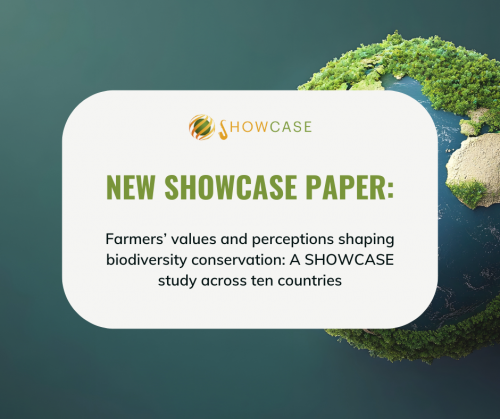This pan-European SHOWCASE paper, authored by partners ZALF, Swedish University of Agricultural Sciences, Universitatea Babeș-Bolyai, Agroscope, Wageningen University, CNRS, Reading University, Estonian University of Life Sciences, Centre for Ecological Research and CSIC, explores how biodiversity conservation strategies are shaped by the values people assign to nature. Understanding these values requires examining how individuals perceive and prioritise different aspects of biodiversity and how these perceptions influence conservation practices.
In agricultural landscapes, farmers play a central role in implementing biodiversity conservation, as sustainable management practices can significantly enhance species diversity and abundance. Farmers’ perceptions, worldviews and values strongly influence their willingness to adopt conservation measures and participate in agri-environment schemes. Despite growing research, few studies have systematically linked farmers’ values and perceptions to their on-farm biodiversity management across diverse regions and farming systems.
This study addresses that gap through 48 in-depth interviews, reconstructing farmers’ decision-making rationales and highlighting the role of instrumental, intrinsic, and relational values in shaping biodiversity practices. The findings provide insights not only for scientific understanding but also for designing policies and programs that better align with farmers’ perspectives, ultimately supporting more effective and sustainable conservation strategies.
Results highlight that biodiversity conservation strategies are fundamentally shaped by values and norms, which in turn influence farmers’ perceptions and decisions regarding on-farm conservation measures. Farmers’ understandings of biodiversity are diverse, ranging from utilitarian, anthropocentric views focused on human benefits to ecocentric perspectives valuing all species intrinsically. These differing perceptions drive their approaches to conservation, from selective management of specific species to holistic landscape-level strategies. Effective biodiversity conservation therefore requires acknowledging this diversity of values and adopting process-oriented, participatory policy approaches that integrate instrumental, intrinsic and relational values. Findings emphasise that regionally adapted programs, co-designed with farmers and promoting deeper ecological understanding, can enhance conservation outcomes and foster collaboration across agricultural landscapes, though further research is needed to translate these insights into concrete policy actions.
Read the full study here.
